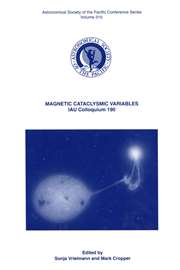Article contents
Mark IV: A Phase Coherent Observing System for Pulsars
Published online by Cambridge University Press: 12 April 2016
Extract
We have built a new radio astronomical receiving system designed specifically for very high precision timing and polarimetry of fast pulsars. Unlike most detectors currently used to study pulsars, this intrument does not square the received signal at the time of observation. Instead, voltages proportional to the instantaneous electric vectors of incoming signals are digitized, time-tagged, and recorded on high speed magnetic media. We have tested the system using a 5 MHz bandwidth signal with 2-bit digitization at the Greenbank 140 foot telescope. Full polarization information was obtained with a 0.2 μs time resolution. We have used this system to study the giant pulses emitted by PSR B0531+21 and PSR B1937+21, to determine high precision dispersion measures, and to perform high precision timing and polarimetry.
- Type
- Part 1 The Pulsar Population
- Information
- International Astronomical Union Colloquium , Volume 160: Pulsars: Problems and Progress , 1996 , pp. 23 - 24
- Copyright
- Copyright © Astronomical Society of the Pacific 1996
References
- 1
- Cited by


